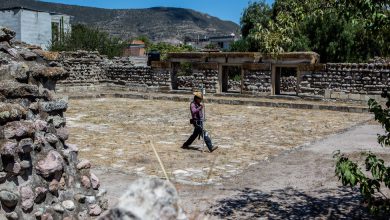Your Tuesday Briefing: Europe Nears an Oil Embargo

Good morning. We’re covering the E.U.’s coming oil embargo, a plane crash in Nepal and Afghanistan’s struggle over its poppy fields.

Ursula von der Leyen, the president of the European Commission, in Brussels on Monday.Credit…Stephanie Lecocq/EPA, via Shutterstock
The E.U. hammers out an oil embargo
The bloc is poised to agree on a sweeping oil embargo, its most far-reaching effort to punish Moscow for its invasion of Ukraine. The embargo would deprive the Kremlin of a key revenue stream and accelerate Europe’s independence from Russian fuel. Here are live updates.
The embargo, if approved, would come at a heavy economic cost for the E.U., which gets about 27 percent of its crude oil imports from Russia and a higher share of its oil products. Member states have been spending around $23 billion each month on Russian crude since the war started and oil prices surged. The embargo would bruise Russia, but the damage would be slow until restrictions kick in.
And it has political stakes as well. Negotiators were forced to capitulate to Hungary’s demand that it be indefinitely exempted from the measure. Prime Minister Viktor Orban benefits from the cheap energy — and his ties to the Kremlin. Hungary’s exemption will have little financial effect because of the country’s small size, but it indicates how much Orban has peeled away from the rest of the bloc.
Fighting: Russian forces in the outskirts of the eastern city of Sievierodonetsk are advancing from two sides, while an explosion on Monday in Melitopol, a Russian-controlled city in Ukraine, appeared to target a pro-Kremlin regional leader. A French journalist was killed by shrapnel in the east.
Diplomacy: As Ukraine demands a fast-track to E.U. membership, moral questions are butting up against practical concerns. The bloc is looking for an alternative route for Ukraine and other countries on Europe’s periphery.
No survivors from Nepal’s crash
At least 21 bodies have been recovered from the wreckage of an aircraft that went down on Sunday in the rocky heights of the Himalayas. One person is still missing, but officials do not expect to find survivors.
The plane, operated by Tara Air, was heading to Jomsom, a picturesque tourist destination popular with trekkers. The flight usually takes about 30 minutes, but the plane went down in bad weather.
“No one is alive,” said Narendra Shahi, an international mountain guide, who was sent to the crash site as part of the rescue operation. “The plane has crashed into pieces. It’s so heartbreaking.”
Details: There were 22 people on board, including 13 Nepalis, four Hindu pilgrims from India and two German trekkers.
Safety: The route is considered one of the riskiest in Nepal: Planes have to fly through narrow valleys, where visibility is often a challenge, and pilots must contend with aging planes and, frequently, bad weather. The E.U. has banned Nepali airlines from its airspace because of their poor safety records.
Solar energy powers poppy fields
The Taliban are trying to fight Afghanistan’s multibillion-dollar drug trade. In April, the government outlawed poppy cultivation, with violators to be punished under Shariah law.
But stamping out opium will be difficult. Farmers use cheap and highly efficient solar panels to power the water pumps that irrigate poppy fields and cash crops like wheat and pomegranates. Subsistence farmers use them on vegetable plots. The panels, which also provide electricity to homes, are now a defining feature of southern Afghan life.
The Taliban have taken aim at some solar-powered pumps. A regional leader ordered them to be confiscated so that newly planted poppies would die. But a widespread crackdown would exacerbate Afghanistan’s postwar economic collapse — the U.N. estimates that 23 million Afghans are suffering from acute food deprivation — and antagonize Pashtun farmers, a core constituency of the Taliban.
Data: Thanks to the pumps, the population of previously uninhabited desert areas in Kandahar, Helmand and Nimruz Provinces ballooned to at least 1.4 million with the expansion of arable land.
Finances: Opium sales provide 9 to 14 percent of Afghanistan’s gross domestic product, compared with the roughly 9 percent that legal exports of goods and services provide.
Background: In the 1990s, the Taliban reduced opium cultivation. But after the U.S.-led invasion in 2001, opium taxes and smuggling helped fuel the group’s insurgency. Now, eradication would require confronting commanders complicit in the trade at a time when the movement faces internal dissatisfaction as its money dries up.
THE LATEST NEWS
World News
-
Colombia’s presidential race is going to a runoff next month. Voters now must choose between two anti-establishment candidates: a leftist former rebel and a right-wing populist.
-
Sexual assault and harassment are





